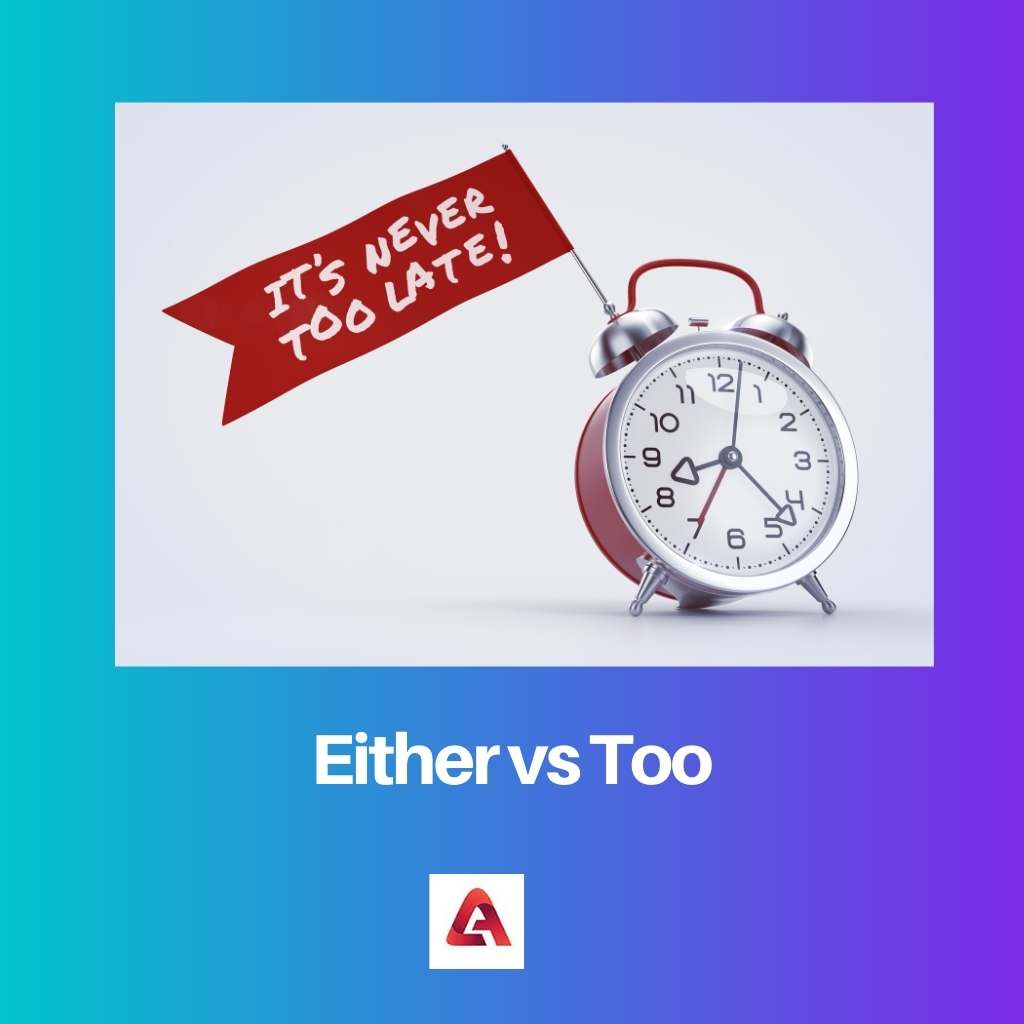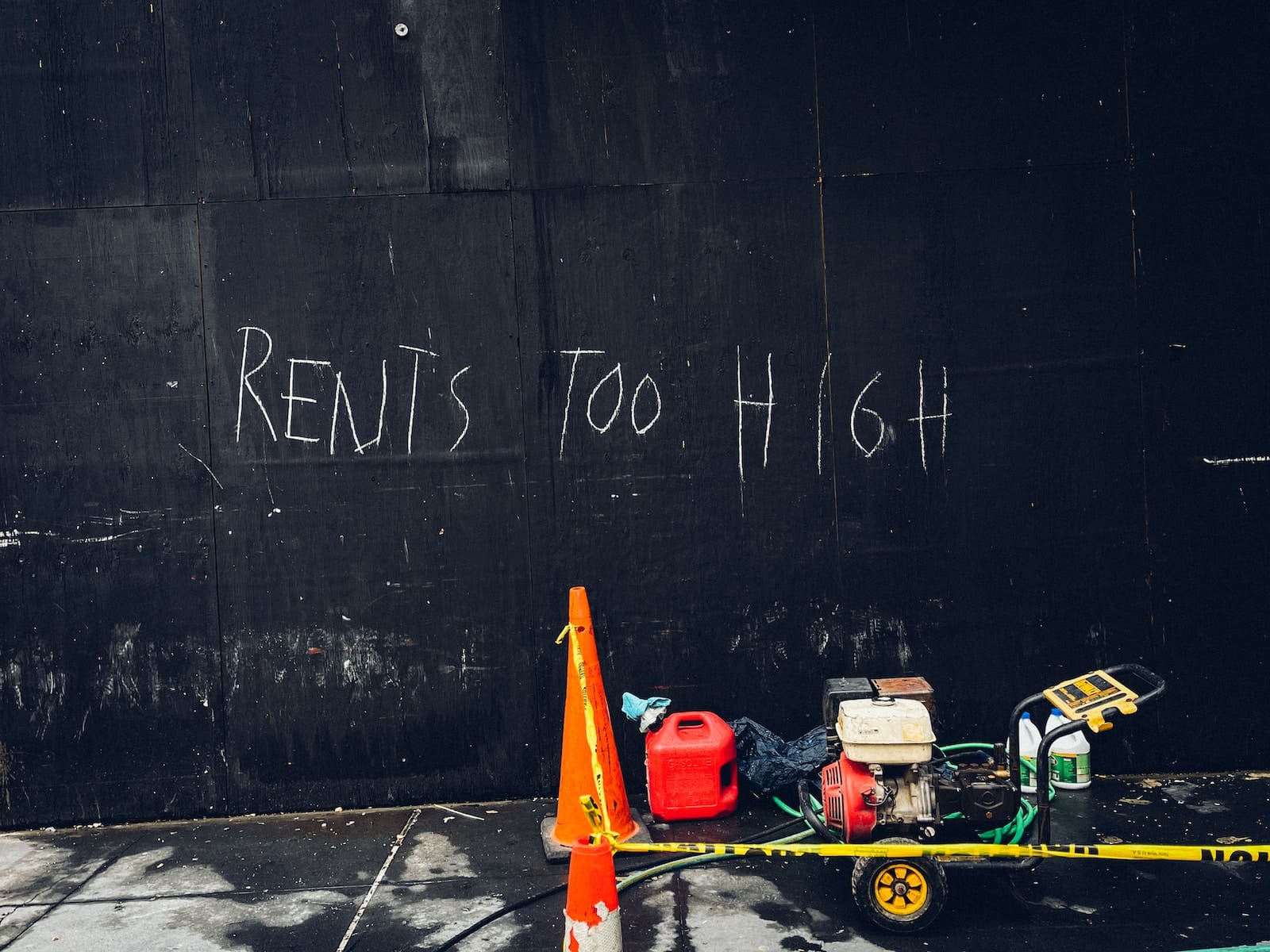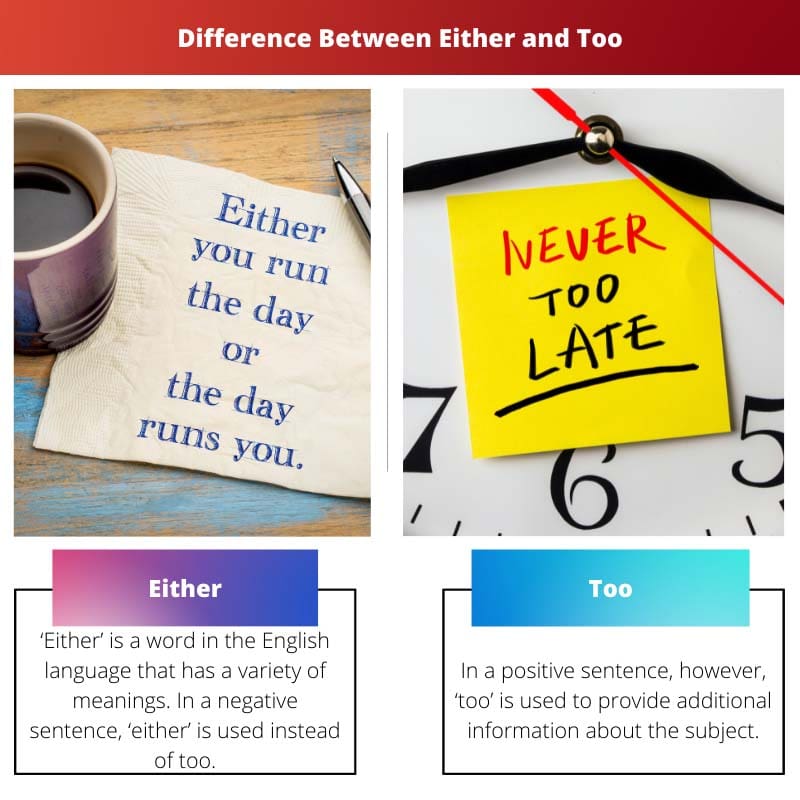English is a widely spoken language all over the world. At its most basic level, the language is simple to learn. It does, however, have depths. Certain words have the same literal meaning but have completely different meanings in context. Here, we’ll look at two such words: either and too. We’ll look at the difference between their meaning and significance.
Key Takeaways
- “Either” implies a choice between two alternatives.
- “Too” indicates an additional or excessive amount.
- Both words have different grammatical functions and cannot be used interchangeably.
Either vs Too
The difference between either and too is that they have different meanings in different contexts. The former expresses approval of a subject in a negative sense, whereas the latter agrees with a positive sense. We’ll go over the differences in more detail with appropriate examples of each word.

‘Either’ is a word in the English language with various meanings. In a negative sentence, ‘either’ is used instead of too. At the end of the sentence, it is used. When a person or thing agrees to do the same thing, ‘either’ is used to add extra information to a negative sentence. Take this as an example. He doesn’t like the movie, and I don’t like it either. We’ll see more examples and different contexts in the future.
In a positive sentence, however, ‘too’ is used to provide additional information about the subject. In this case, the word ‘too’ is used at the end; you can relate to it with ‘also’. It also comes before a single verb rather than at the end of the sentence. Like for example, Shreya speaks German and Akanksha speaks English too. In this sentence if we use ‘also’, the sentence would be, Shreya speaks English and Akanksha also speaks English. The meaning remains the same.
Comparison Table
| Parameters of comparison | Either | Too |
|---|---|---|
| Can we use it in a positive sentence? | No | yes |
| Can we use it in a negative sentence? | yes | No |
| Can we use it to compare two things? | Yes | No |
| Can we use it as a sign of excess? | No | Yes ( i ate too many sweets on Diwali) |
| Is this a conjunction? | Yes | No |
What is Either?
Either is an expression that is used in different contexts. Certain words in the English language have completely different meanings when used before a noun, verb, or other word. The first example is when the word ‘either’ is used as a determiner. Determiners are words that come before a noun, and in this case, the word ‘either’ expresses a preference or a choice. For example, I don’t like chocolate either. Either can also be used before ‘of the’, as either of the kids is not in proper uniform. Here a plural noun is thereafter ‘either’. In a few sentences, ‘either’ signifies both. In this case, ‘either’ is used before a singular noun, and it means both. For instance, there were stones on either side of the alley.
‘Either’ can be used as a pronoun as well. Let’s say you’re asked, “Which of the T-shirts do you like?” You can answer: I don’t like either. In addition, if you like both preferences, you can say ‘either’. It means that it doesn’t matter which one you choose.
We can use ‘either as an adverb as well. In this article, the difference between either and too is based on this context. Both denote the addition of additional information to a sentence; one is used in negative sentences to agree, while the other is used in positive sentences to agree. For example, the ride was great, and it wasn’t tough either. Either can also be used as a conjunction.
What is Too?
Too is used as an adverb. It expresses additional information, and you can use it in a positive sentence. While using adverbs like ‘too’ and ‘also,’ it is important to know how to place these words in a sentence. They both denote the same meaning, but while used in a sentence, it must be done correctly. Ram is going to the event, and Sita is going too. Here too, is used at the end of the sentence. Also, it is to be noted that if you are trying to use too in a formal way, you have to use it after the subject. Suppose your team leader says I missed yesterday’s match. You can reply by saying I, too, missed it. Now here are two important things to note. The comma before and after the adverb too is very important in this context.
Too can also be used to express the meaning of excess. For example, the book is too heavy to lift. What it implies is that the book is so heavy that you can not lift it. Although the sentence is positive, it discusses a negative aspect. Here too is used as excess or heavy. You can use this to express something to a greater extent than you desire.

Main Differences Between Either and Too
- Either is used in negative sentences, whereas too is used in a positive sentence.
- Either can be used as a determiner, adverb, conjunction, or pronoun, while too is an adverb.
- We cannot use either to denote anything excess, whereas too is used to denote something excess.
- Either denotes a choice or preference between too, whereas too is not used to denote the same.
- Either is similar to neither, whereas too is similar too also.

- https://meridian.allenpress.com/her/article-abstract/49/3/297/31050
- https://search.proquest.com/openview/111accf0f58d4e948aa8aa8e8e44530a/1?pq-origsite=gscholar&cbl=35192

Reading this article has given me a greater understanding of the differences between ‘either’ and ‘too’. The examples provided were very informative.
Words in the English language are so interesting. It’s fascinating how similar words express different meanings in different contexts. I would like to see more examples of both words being used.
I thoroughly enjoyed reading this article. It’s refreshing to delve into the complexities and nuances of the English language. The comprehensive comparison table was particularly enlightening.
As someone who is passionate about linguistics, I found this article to be intellectually stimulating. The breakdown of the meanings and contexts of ‘either’ and ‘too’ was exemplary.
The use of ‘either’ and ‘too’ had always been a bit confusing to me, but this article has made it much clearer. I appreciate the detailed explanation of their different grammatical functions.
I found the explanations of ‘either’ and ‘too’ to be very insightful. It’s crucial to distinguish between their meanings, especially in negative and positive sentences. The references provided add credibility to the information presented.
The article does a great job of explaining the meaning and usage of ‘either’ and ‘too’. It’s important to understand why these words cannot be used interchangeably. I would like to learn about more examples of the use of ‘too’ as an adverb.
The comparison table is very helpful. It’s great to have a clear and concise summary of the differences between ‘either’ and ‘too’.